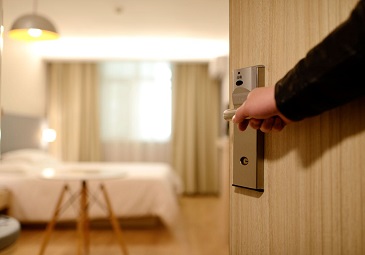 NATIONAL REPORT—The hotel industry is one of the most successful in the world, but also one of the most competitive. Statistics show that there are literally hundreds of thousands of hotels worldwide, each competing with the surrounding establishments for the attention of each and every traveler, and all doing what they can do to stay ahead of the game and keep up with the competition.
NATIONAL REPORT—The hotel industry is one of the most successful in the world, but also one of the most competitive. Statistics show that there are literally hundreds of thousands of hotels worldwide, each competing with the surrounding establishments for the attention of each and every traveler, and all doing what they can do to stay ahead of the game and keep up with the competition.
The roles and responsibilities of a hotelier can therefore be varied and numerous, as it’s vital to constantly try to think two steps ahead and explore every avenue to improve your service, appeal to the widest audience, and get more guests through the door. One of the best ways to do this is to ensure that your rooms are always clean, comfortable, and welcoming.
Unfortunately, a common problem that many hoteliers must deal with is an outbreak of mold in the rooms. This can occur in all kinds of places all over the world, and it can be very damaging, not just for the health and safety of your guests, but for the reputation and future success of your establishment as well. This guide will look at causes, effects, and preventative methods for mold in hotels.
What Exactly Is Mold?
Mold is a naturally-occurring fungus that can grow in almost any kind of environment, provided it has a steady supply of air and moisture. Molds can spread and expand through the release of microscopic spores that float in the air until they connect with a surface and begin to grow.
Molds are living creatures, and when there are only small amounts, they can be hard to detect, but as their numbers increase, they become more visible and more dangerous too, releasing volatile organic compounds (VOCs) into the surrounding air which can cause all kinds of health issues.
What Are the Causes of Mold?
Mold is a natural organism, present all over the world, so it is not something that we can simply stop, eradicate, or avoid entirely. However, there are certain conditions that molds enjoy more than others, and they find it particularly easy to grow and reproduce in moist areas or damp spots.
This can be a big issue for hotels, as moist areas may appear in the rooms, often around the bath or shower, or in the bedroom itself. This is due to the HVAC systems present in many hotels which are effective at controlling the temperature but not so useful for reducing humidity levels. Because of these systems, moisture can easily build up, presenting the ideal conditions for mold to prosper.
Another reason why mold can be so common in hotels is due to the large amount of foot traffic. A lot of people are coming and going from the rooms each day, and hotels can have dozens or even hundreds of rooms, so trying to keep track of every little change and every square inch of floor, wall, and ceiling space can be challenging.
What Are the Effects of Mold?
Mold can present a range of problems for hotel owners. Firstly, mold patches are unsightly, making your rooms less attractive and far less welcoming. Guests who spot mold in a room may even wish to leave, change rooms, or leave bad reviews of your establishment. They will be less likely to recommend the hotel to friends or return in the future.
There are also various health risks. Mold can cause attacks in asthma sufferers, as well as trigger respiratory problems in others. Molds have been linked with neurological symptoms like anxiety and confusion too, and some fungus outbreaks have even led to severe cases of organ failure and death.
How to Prevent and Deal with Mold
Clearly, mold is something that any hotel owner will want to avoid, and here are some useful tips and strategies to help you prevent mold from forming in the first place, as well as dealing with any outbreaks that do occur.
- Visual Checks Are Key—One of the best ways to stop serious mold spreads and outbreaks is to make sure that your cleaning and maintenance staff are under instructions to check every room carefully. By visually inspecting each room on a regular basis, you may not be able to prevent mold, but you can at least detect it early and treat it quickly.
- Air Tests May Be Needed—Visual inspections are useful, but they are only really good for detecting mold that has already settled and started to grow. One way you can detect mold before it becomes visible is to carry out air sampling tests. This will help you to determine the presence of mold spores in the air of your rooms and make changes accordingly.
- Improve Problem Areas—There are many potential causes of mold in your hotel, such as old windows that have cracks in the frames or a weak ventilation system that does not properly air out your rooms. Make the necessary changes, like fitting new windows and installing dehumidifiers, as needed.
- Clean with Care—Hotel rooms and items of furniture need to be cleaned on a regular basis to help reduce the risks of mold, and for general hygiene, but you must clean with care. Make sure to follow manufacturer guidelines when cleaning large items, as certain products, or the use of water on certain surfaces might increase the chances of mold.
- Optimize Temperature—When rooms get too cold, the moisture in the air begins to be released, condensing on surfaces like windows and drywall. This gives mold better conditions to grow. To prevent it, make sure that your rooms are kept at an adequate temperature, even when they are not in use by your guests.
Final Word
Mold is just one of the many problems you may have to face as a hotel owner or hotelier, and it needs to be taken seriously. Make sure to check rooms regularly, clean them correctly, and know the risks of mold so you can deal with it correctly.







